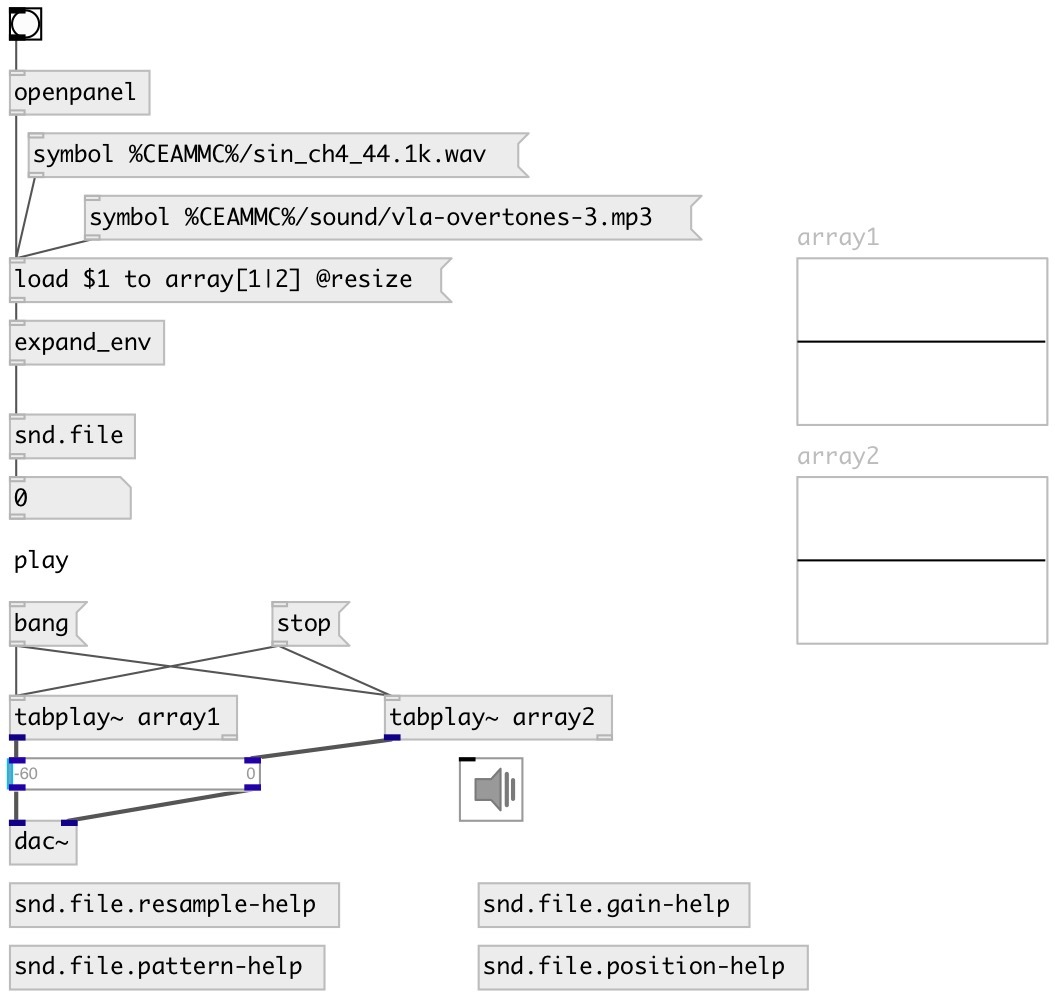PureData CEAMMC web documentation
PureData CEAMMC library web documentation
Distribution download
index :: snd
snd.file
sound file loader with additional features
available since version: 0.1
information
Deal with sound files: gets files info and loads them into arrays. Various formats are supported. Supports array name patterns.
methods:
- load
Loads sound file. Outputs info properties and number of loaded samples after
load.
parameters:-
PATH path to soundfile
type: symbol
required: True -
to ARRAY_NAME destination array names or pattern. Array patterns specified in square braces: array_[1-4] means - array_1, array_2, array_3, array_4. array_[left|right] means array_left and array_right
type: symbol
required: True -
[@resize] resize array to fit loaded samples
type: property -
[@channel N] specify input channels. Spaces separated list or range x-y.
type: property -
[@normalize] normalize array after loading
type: property -
[@gain V] apply gain to loaded samples, examples: +3.1db, -6db, 0.5 etc.
type: property -
[@begin X] specify input file begin position, by default in samples, but you can use other units: 1s, 10ms, 00:01.12 (smpte). To specify value relative to file end you can use $-X syntax
type: property -
[@end X] specify input file end position, by default in samples, but you can use other units: 1s, 10ms, 00:01.12 (smpte). To specify value relative to file end you can use $-X syntax
type: property -
[@length X] specify input length, by default in samples, but you can use other units: 1s, 10ms, 00:00:02.00 (smpte)
type: property -
[@offset SAMPLES] offset in samples from beginning of file. Deprecated, use @begin instead
type: property -
[@resample R?] if R is not specified - resample from file samplerate to current Pd samplerate. But you can manually specify R as float value or integer fraction - 44100/48000
type: property
-
- save
Save arrays to specified file
parameters:-
ARRAYS list of arrays
type: list
required: True -
@to FNAME output filename
type: symbol
required: True -
[@begin X] specify input array begin position, by default in samples, but you can use other units: 1s, 10ms, 00:01.12 (smpte). To specify value relative to array end you can use $-X syntax
type: property -
[@end X] specify input array end position, by default in samples, but you can use other units: 1s, 10ms, 00:01.12 (smpte). To specify value relative to array end you can use $-X syntax
type: property -
[@gain V] apply gain to saved arrays, examples: +3.1db, -6db, 0.5 etc.
type: property -
[@in_sr SR] array source samplerate, if omitted using patch samplerate
type: property -
[@out_sr SR] output samplerate
type: property -
[@norm[alize]] normalize output
type: property -
[@overwrite] overwrite existing file flag
type: property -
[@samp FMT] output sample format. Supported values are: 0(use default), 8, 16, 24, 32, f
type: property -
[@wav] WAV output format
type: property -
[@mp3] MP3 output format
type: property -
[@ogg] Ogg/Vorbis output format
type: property -
[@opus] Opus output format
type: property -
[@aiff] AIFF output format
type: property -
[@txt] TXT output format
type: property -
[@raw] RAW output format
type: property -
[@flac] FLAC output format
type: property
-
properties:
-
@channels (readonly) Get list of loaded channels into each array
type: list -
@filename (readonly) Get filename
type: list -
@formats (readonly) Get list of supported formats
type: list
default: AAC AIFF ALAC AU AVR CAF FLAC HTK IFF MACE3:1 MACE6:1 MAT4 MAT5 MP3 MP4 MPC OGG PAF PVF RAW RF64 SD2 SDS SF VOC W64 WAV WAVEX WVE XI -
@samples (readonly) Get list of number of loaded samples into each array
type: list -
@smpte_fr Get/set SMPTE framerate for SMPTE offset calculations
type: float
range: 1..99
default: 30 -
@sr (readonly) Get source file samplerate
type: list -
@verbose (initonly) Get/set verbose output to Pd window
type: bool
default: 0
inlets:
- input inlet
type: control
outlets:
- number of loaded/saved samples or -1 on error
type: control
keywords:
Authors: Serge Poltavsky
License: GPL3 or later
